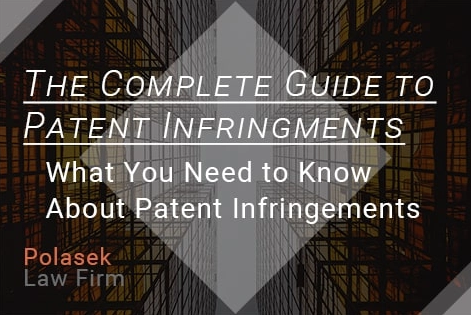
Having a patent gives you the right to prevent others from making, using, or selling your patented invention.
If a company or individual does one of these things, the patent owner may have a cause of action for a patent infringement case.
If you believe someone has infringed on your patent or if you have been accused of patent infringement, reach out to an experienced patent litigation lawyer as soon as possible.
Your lawyer can evaluate the claim and provide you with legal advice.
The Polasek Law Firm can assist you.
Polasek Law Firm has been advising clients on patent infringement issues for more than 25 years.
Please give the firm a call at (832) 485-3580 or send an online message. The initial consultation is at no charge.
We’ll review the different types of patent infringement with examples.
What Is a Patent in the United States?
The United States Patent and Trademark Office (USPTO) grants patents to inventions that are new, useful, non-obvious, and not excluded from patent eligibility under federal law.
A utility patent typically lasts for 20 years from the filing of the application.
What Are the Different Types of Patent Infringement?
There are several types of patent infringement. Infringement can be direct or indirect, and it can be literal or under the doctrine of equivalents.
Direct Infringement
Direct infringement occurs when someone directly violates your patent rights. That is, they make, use, sell, offer to sell, or import your patented invention.
Indirect Infringement
Indirect infringement occurs when someone provides support for directly infringing activity. Indirect infringement can be through inducement or contributory infringement.
Induced Infringement
Induced infringement occurs when a party with knowledge of the patent encourages or influences someone else to commit acts of infringement. For example, the person might provide someone with instructions for creating the patented invention.
Contributory Infringement
A person commits contributory infringement when they supply components of a patented invention knowing that the components will be used to infringe a patent.
For contributory infringement to exist, the component must have no substantial non-infringing uses. For example, if someone sold a product that would be useful only if combined into a patented product, that might be considered contributory infringement.
Literal Infringement
Literal infringement occurs when a device or process literally meets every limitation in a patent claim. If even one component is different, it cannot be considered literal infringement.
Infringement Under the Doctrine of Equivalents
If someone has not literally infringed a patent, there still may be infringement under the doctrine of equivalents.
Equivalent infringement may occur when the corresponding pieces of the accused product or process are not substantially different from the corresponding limitation in the claim of the patent.
Call 832-485-3580 For a Free Consultation Today
What Is The Effect Of Willful Patent Infringement?
In the case of willful infringement, a court can triple the amount of damages that it would normally award to a patent holder.
Infringement is not literally willful if an infringer had a good faith belief that it was not violating the patent or that the patent was invalid. In that case, they may still be liable for infringement.
What Types of Remedies Are Available for Patent Infringement?
Remedies for patent infringement may include injunctive relief and damages.
An injunction orders someone to stop their infringing actions.
Money damages are typically awarded for these types of patent infringement under the patent laws, a patent owner is entitled to at least a reasonable royalty.
Additionally, in certain instances, a patent owner may be able to recover lost profits from an infringer.
How Can The Polasek Law Firm Help You?
John (Ted) Polasek has spent the past 25 years working on all types of patent infringement cases.
He has experience with both enforcing patents and defending accused infringers.
Ted believes in providing one-on-one personalized service for each client.
Contact the patent litigation lawyers at the Polasek Law Firm today through the online form, or give the firm a call at (832) 485-3580 to schedule a free consultation.
Polasek Law Firm is ready to help with your patent infringement case.


